الملخص
The main cause of high DEWA bills in Dubai is an inefficient AC system struggling against heat and humidity. The biggest culprits are dirty coils and clogged filters, which force the compressor to run longer and harder, wasting up to 40% more energy. Other major drains include duct leaks and setting the fan to “ON” instead of “AUTO.” To save money, residents must prioritize monthly filter cleaning and professional deep coil cleaning twice a year to restore efficiency.
For residents in Dubai, the biggest single contributor to the dreaded high DEWA bill is almost always the air conditioning. In a climate where AC runs 24/7 for much of the year, controlling electricity consumption isn’t about switching off lights—it’s about optimizing your cooling system. Even small inefficiencies can translate into hundreds or thousands of Dirhams wasted annually, silently siphoned off by a struggling unit.
Your cooling system is not just failing to cool—it’s actively **consuming excessive energy** because it has to compensate for performance issues. This means you are paying a premium for substandard comfort. Understanding the specific technical failures and environmental factors that drive up this energy waste is the essential first step to reclaiming control over your monthly expenses. Ignoring a struggling AC is equivalent to opening your wallet directly to the utility company.
1. The Direct Energy Cost of Poor Maintenance
The majority of excessive energy consumption comes from easily avoidable maintenance issues. When components get dirty or fail, the AC unit works longer and harder without successfully achieving the set temperature, a phenomenon known as “long-cycling.”
Clogged Air Filters: The Energy Drain
A simple clogged air filter creates resistance, starving the system of the airflow it needs. When airflow is restricted, the blower fan motor has to draw more power to pull air through, and the evaporator coils (indoor coils) struggle to exchange heat. The system compensates by running for longer periods, consuming energy far beyond its intended rate. Industry data suggests that this simple oversight can increase your unit’s energy use by **5% to 15%** immediately.
Fouled Coils: The Efficiency Killer
This is the primary reason for skyrocketing DEWA bills. The efficiency of an AC unit hinges on its ability to exchange heat across its coils. In Dubai’s sandy environment, this process is constantly under attack:
- Evaporator (Indoor) Coil: When this coil is coated in dust and dirt, its ability to **absorb** heat from the indoor air is drastically reduced.
- Condenser (Outdoor) Coil: When this coil is caked in sand, it cannot **reject** heat effectively into the atmosphere. The heat builds up, forcing the refrigerant pressure and temperature to dangerous levels.
The result is that the compressor—the unit’s energy hog—must run at maximum output for prolonged cycles, leading to huge, sustained spikes in power draw. An AC running with dirty coils is essentially fighting itself, and you pay for every minute of that losing battle.
Low Refrigerant Levels (Leaks)
Refrigerant leaks are not just a cooling issue; they are an efficiency killer. An undercharged system cannot complete the thermodynamics of the cooling cycle efficiently. The compressor, trying to maintain system pressure, is forced to run non-stop without achieving adequate cooling. The compressor runs and runs, consuming maximum energy, but the apartment never gets truly cold, leading to wasted electricity and poor comfort.
2. System Age, Design Flaws, and Environmental Stress
Beyond simple dirt, structural issues and environmental pressures contribute heavily to energy waste.
The Hidden Cost of High Humidity
Dubai’s coastal humidity places an immense hidden load on the AC system. An AC unit does two jobs: it cools the air and it removes moisture (dehumidifies). When humidity is high, the unit spends a significant portion of its operational time and energy merely condensing water vapor. While this process is happening, the unit is not cooling the air as effectively. This extra, intense effort drives up the compressor run time, and thus, your bill.
Aging Components and Mechanical Drag
Even with perfect maintenance, a system older than 8-10 years begins to lose efficiency. Older units often use less efficient, non-inverter compressor technology. As the system ages, internal wear and friction increase in the motor and compressor. This increased mechanical resistance means the components require more current just to operate, resulting in a steady, inescapable increase in your electricity bill.
Poorly Sealed and Insulated Ductwork
In ducted AC systems common in many apartments, ductwork is often neglected. Leaks and gaps in the ducts, exacerbated by the intense temperature contrast, allow cooled air to escape into false ceilings or voids before it reaches the rooms. Studies show that duct leakage can account for **15% to 30% of cooling energy loss**. Your AC cools the building’s infrastructure, not your living space, meaning it must run much longer to satisfy the thermostat.
Did You Know? A dirty AC unit can increase your electricity consumption by 30% to 40% during peak summer months compared to a well-maintained unit.
3. Inefficient Usage and Technical Diagnostics
Usage habits and deeper technical issues also contribute significantly to overspending.
The Inefficient Fan Setting: “ON” vs. “AUTO”
Many residents keep their AC fan set to **”ON”** instead of **”AUTO.”** When the fan is set to “ON,” it runs continuously (24/7), even when the compressor is off. This not only consumes constant fan power but, more critically, it re-evaporates moisture off the cold indoor coil back into your apartment after the cooling cycle stops. This increases the room’s humidity, forcing the compressor to kick on sooner and run longer, thereby wasting energy and creating clammy air.
The Short-Cycling Problem
This is often a sign of an **oversized AC unit** or severe maintenance issue. The unit cools the space too quickly, turns off, and then restarts shortly after. This rapid on-and-off cycling is extremely inefficient. Compressors draw the most current upon start-up, so frequent cycling drains power and shortens the unit’s lifespan.
Electrical Component Resistance
Aging capacitors, contactors, and wiring can develop increased electrical resistance. This resistance generates heat and reduces the efficiency of the motor, causing it to draw more current (amps) than necessary just to function. A professional can use an amperage meter to diagnose these electrical faults.
4. How to Start Saving: Your Action Plan
Taking proactive steps can immediately reduce the strain on your AC and lower your DEWA bills. Focus on these simple habits and professional maintenance:
| Action | Impact on Energy Savings | Recommended Frequency |
|---|---|---|
| Filter Cleaning/Replacement | Can reduce energy consumption by 5% to 15%. | Monthly during peak summer. |
| Set Fan to “AUTO” | Eliminates continuous fan power draw and improves dehumidification. | Immediately. |
| Professional Deep Coil Cleaning | Restores unit performance to near-factory efficiency levels, maximizing heat exchange. | Twice Per Year (before and after summer). |
| Ductwork Inspection/Sealing | Prevents cooled air loss (up to 30%), significantly improving efficiency. | Every 3-5 years. |
| Insulation Check | Seal windows, doors, and any gaps to stop outdoor heat infiltration. | Seasonally. |
If your AC unit is working harder than it should, you are simply paying for wasted energy. Regular, dedicated maintenance is the most cost-effective long-term strategy to fight back against those high DEWA bills and ensure maximum comfort without maximum cost.
Fight High DEWA Bills with Efficiency
Ensure your AC is operating at peak efficiency to stop wasting energy. For system diagnostics, deep cleaning, and efficient repairs, contact a trusted **Z0Deg AC contractor for Dubai** for an energy audit and comprehensive maintenance service.
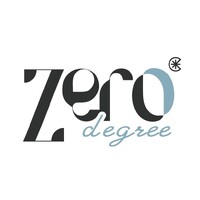


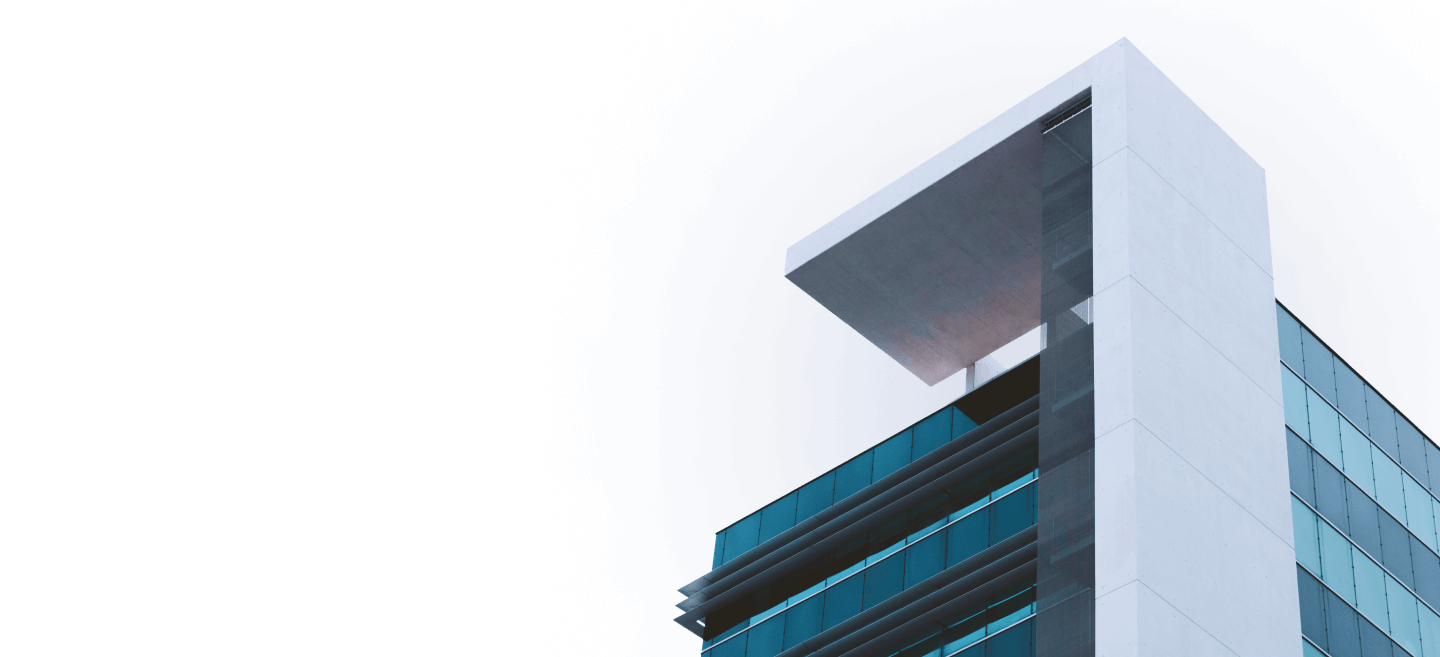
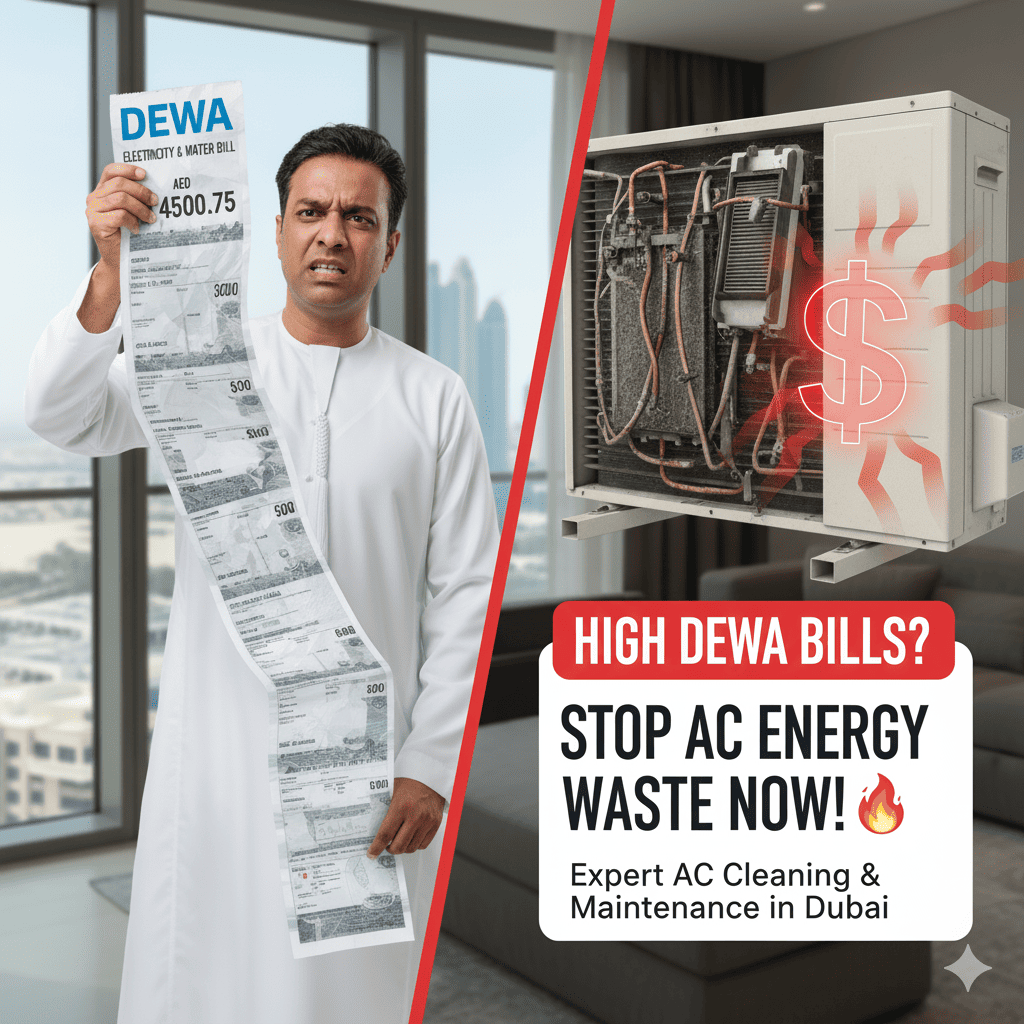
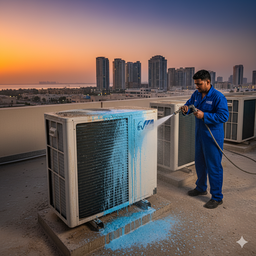
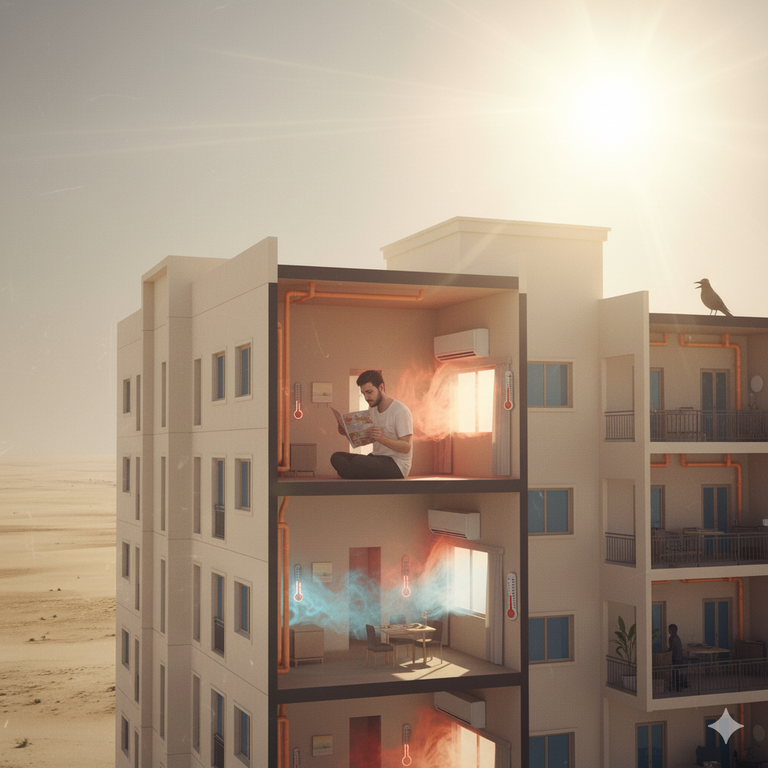
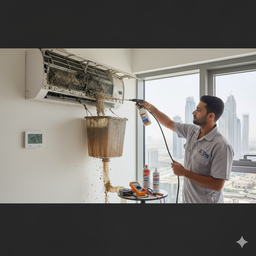
اترك تعليقاً